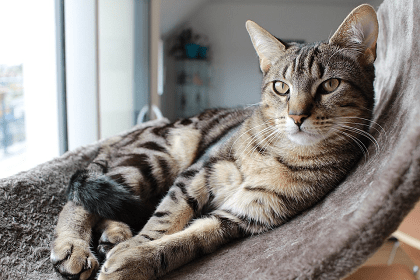You probably think that because your kitty is strictly an indoor one, it can’t catch fleas, but in fact, it’s more possible than you think. It only takes one flea before there are hundreds and even thousands more. Within a three-week period, one flea can multiply to 1,000 fleas.
That’s a whole lot of fleas that will be on your pet, not to mention your entire house; particularly in carpets, soft materials, and bedding, which are areas they like to hang around in.

Where Do Fleas Come From?
Fleas can spread in a variety of ways. It’s common that a flea can get transmitted from one cat to another, or from one animal to your cat. Besides that, if your home was ever subject to a flea infestation that wasn’t completely dealt with, your cat could have picked it up right from your own home. You need to work on solving the problem as quickly as you can first, and then see where or what the source was since it’s not always easy to pinpoint the source.
A flea can lay around 50 eggs daily on your cat, which then spread to the environment. Warm environments are good breeding grounds for fleas. Flea eggs may remain dormant for up to two years, until a host comes in. But then it may only take a couple of seconds for the flea to arise and attach itself to the host.
Problems Arising From Fleas:
- Anemia: Weakness, and rapid breathing, especially in kittens or older cats
- Flea allergy dermatitis: Intense skin irritation that goes beyond a flea bite location, causing possible hair loss around the tail, belly and inner thighs
- Tapeworms: They can attach to your cat’s intestines
- Bartonella: Infections could be mouth and gum disease, eye inflammation and even heart disease.
Flea treatments
As you can see, the problems can be severe. Like in all human medical conditions as well as animals, prevention is better than cure. Some treatments are natural, some are not. Chris Lambrecht, from pestpolicy.com, says that “never use the same flea treatment on a cat as you would use for a dog. This is due to permethrin toxicity that would cause permethrin poisoning.”
Permethrin is an insecticide and is more toxic to insects than it is for people and dogs. Cats are more sensitive to permethrin than dogs which is why they can get poisoned from it. Humans and dogs can break it down quickly, but not cats. A flea problem will not go away on its own, so your kitty needs your help, and there are several other types of treatments that will work if you read and know more about them.
One tiny flea can present one jumbo of a problem. If you notice your cat scratches itself a lot or has a type of skin problem, it’s very possible it could be because of fleas. You can find several flea treatments for cats, but if it’s a persistent problem, it’s best to contact your vet. You want your cat to be comfortable, healthy and bossy as she normally would without anything bugging her.
